- Home
- Mary Anne Kelly
Jenny Rose Page 8
Jenny Rose Read online
Page 8
“I don’t get it.”
“All right so I’m telling you. The deal was Aunt Dierdre would agree to take me only if my birth mother would swear never to come for me, never let on I was hers. Dierdre didn’t want to go to all the trouble of raising a bairn, such a wildlookin’ one as they say I was”—Jenny Rose raised her fingers over her head and made them shake electrically—“‘with black bush for hair and pagan red lips’ and then have to give me up just because my mother changed her mind. After all the work was done, like. I mean, don’t you agree?”
“Yes, but—”
“So your sister Carmela vowed never to return and lay claim on me. Right hand on the Bible and the whole bit. Or so the story goes.”
I shook my head in astonishment. And what about poor Carmela? What kind of emotional blackmail had these Irish aunts inflicted on her to bully her that much she’d never try to see her own child? Never even confide such a loss to her sister! Imagine having a daughter this worthwhile and not being able to see her, touch her … And she was the mirror image of Carmela, except for the eyes. Such eyes! Black spikey lashes around pools of flashing hazel. Under all that wild black hair and fisherman’s clothing, there lurked a beauty, I felt sure. The rain came down, whoosh, all at once.
“We’d better go back in,” Jenny Rose said, pushing the boys out of the way. She wasn’t shy in front of them now. That all seemed to have been replaced with disdain. She walked me into the viewing room, led me to a folding chair and sat beside me. I took this as a sign of acceptance. I was enormously proud to be close to her, it was funny. My niece. What would Zinnie say? There was no way I was going to keep this from her. We would have fought over being Godmother to this one. I noticed Jenny Rose go red and I looked up to see Willy Murphy stumble past. Willy Murphy? I watched him with new interest. He had a way about him, all right. Loose and at home. Made you feel at ease like it was his job to do it. Worried that you’d worry for him that his stuttering would upset you.
I supposed Jenny Rose could do worse. He had a great crop of hair. Didn’t look like a big drinker. From what Liam had said I guessed he was the one to be heir to the Bishop’s seat. Bernadette was placing a plate of chipped beef on his lap and in general fussing all over him. Bernadette, too? I thought. Good grief. I tried to understand Jenny Rose’s dynamics with Bernadette. It was easy. Bernadette bullied and Jenny Rose stayed out of her way. Out of everyone’s way.
It was nice that Jenny Rose was humble but maybe she was a little too humble. Almost as if she’d heard my thoughts, she got up and moved to the first row of folding chairs, where she belonged. I noticed Audrey Whitetree-Murphy, two chairs over and on the end, didn’t bother to get up and move. She should have, after all. She wasn’t family, just local gentry. Maybe my American eyes just had a different way of looking at things. Still, a real lady would have the graciousness to leave the front for the immediate family.
Jenny Rose didn’t look like she was praying, just chewing off the rest of the chipped raw umber from her paint-crusted nails. Well-groomed Bernadette, arms folded, one foot up in the air, rocked beside Willy Murphy, laughing at whatever he said, and Murphy, polite and affable, made what could only be called puppy eyes at pale Jenny Rose every time she didn’t look at him. So maybe he loved her too. My heart leapt with hope for her.
Liam introduced me to the woman from the bus, the one with the broken foot, a Miss Fiona Ferry. She was a gaunt, wormy lady with stringy gray bangs and hopeless hair. Miss Fiona Ferry wore sliced oxfords and sported a thorn stick in deference to her impressive bunions. Liam said, “Fiona, what about it, will you give us a tune?” and no sooner were the words out of his mouth did Fiona stand up and I thought, Oh boy, here goes, but no, the purest tones emerged from that scraggly throat. She sang, “Here I Am, Lord,” and then a song about Skibbereen in the potato famine. Then we got down to the business of prayers and I’m afraid I dozed a little bit.
The protocol, apparently, after the prayers, is everyone gets up and says a few words about the deceased. I sat up attentively. “Dierdre,” Liam swung around with his drink in his hand, “used to tell me I was no good at all at all. That I would not amount to much. Now never will she know that she was right.”
When it was my turn, I shyly admitted to not knowing poor Aunt Dierdre. Wishing I had. “Never mind,” Mrs. Driver said, “you can recite a poem if you like.”
“I couldn’t,” I said aghast, but mentally reviewing “In Flanders Fields” just in case they made me.
Liam swaggered up to the casket.
“Go on, Liam,” someone said. “Give us ‘The Ballad of the Foxhunter.’”
The crowd, upright, rocked in expectation in their seats and I was momentarily disappointed they’d given up on me so easily.
Liam planted his graceful, suede-covered feet far apart and placed his body in a boxing position. He called,
“Now lay me in a cushioned chair,
and carry me, you four,
With cushions here and cushions there,
to see the world once more.
And someone from the stables bring
My Dermot dear and brown,
And lead him gently in a ring,
And gently up and down.”
They nodded happily at one another. I was standing there with my arms crossed and I looked down. Last week’s Southern Star was on the hassock, folded open to the entertainment section. “Native Son Honored” caught my eye and I thought, What?! It was just far enough away I didn’t have to use my glasses. There was the source of my own broken heart, Temple Fortune.
“Last night,” it read, “at the New Cork Hotel’s most glamourous affair this year, the Marist Brothers Favorite Son Award went to Temple Fortune, film director and graduate of Holygate, on location filming Beneath here in County Cork…” It went on about the other illustrious guests in smaller print.
Temple Fortune. Temple Fortune. I put my glasses on. I picked the paper up. There he was. He laughed and lived. It cut me, just to see his eyes sparkle. My heart thudded at the memory of him. I knew exactly when it had been, just when I was settling into my long skirts and comfy beige cardigans, happy with being who I was, living a full life, settling down to recollection.
Then there he was, exciting me at the prospect of my days. I was suddenly looking, pleased with myself, in the still friendly mirror. There was still time, it told me, still time.
I looked again at the newspaper: “… the party continued their celebration on into the wee hours at the Beechers Inn…” it read. Assorted buxom lovelies trimmed the periphery of the photograph. It had nothing to do with me. I let the paper flutter into the delicate wastepaper basket.
* * *
“Now leave the chair upon the grass,”
Liam’s good voice rang out,
“Bring hound and huntsman here,
And I on this strange road will pass
Filled full of ancient cheer.”
As if on cue, the glasses all around me clinked. I swallowed mine as well. I swallowed that sherry whole.
“Brown Dermot treads upon the lawn.” Liam swung his head with enthusiasm, knocking into Seamus.
“And to the armchair goes,
And now the old man’s dreams are gone,
He smooths the long brown nose.”
The thing was, desire had so crippled me and for so long, I couldn’t bear to start it up again. It was like the Buddhists say, and the Hindus too, for that matter: desire is the thing which causes pain.
“One blind hound only lies apart
On the sun-smitten grass;
He holds deep commune with his heart:
The moments pass and pass.”
I put my head in my hands. My desire for him had ruined every good thing around me.
“The blind hound with a mournful din
Lifts slow his wintry head;
The servants bear the body in;
The hounds wail for the dead.”
“Here here to Dierdre, then,�
� Willy Murphy said, lifting high his glass and draining it. “Who loved nothing more than a good ride on a spirited horse!”
There was a general blowing of noses, followed by a moment of silence. Then Seamus announced, “I seen a two-headed horse. A couple a times, it was.”
“And to Yeats,” said Dayday Driver.
We drank again.
Then Liam cheered up and said, “Isn’t it a shame we don’t have a camera, all the family here at once and all.”
“I’ve got my camera,” I said, not caring. “I thought myself rude to bring it up. I didn’t want to be the pushy American,” I admitted.
“Don’t be daft,” they all reassured me at once.
“Liam was only after droppin’ a hint,” Jenny Rose said, selling him out.
“It’s just to give you something to do,” Aunt Bridey said to me, minimizing any generosity on anyone’s part.
Bernadette clearly disapproved. “Such an archaic idea!” She took hold of her throat. “If they all knew how hilarious they looked!” She batted her eyes at me.
So you never know. Off I go, much too delighted by far for the occasion, but I really love what I do. I am ambitious and I had a feeling these would be the best shots I’d ever taken. I came back to find everyone lined up on folding chairs, ready to be portrayed beside the coffin. Even Bernadette had powdered her nose and sprayed her hair. I was so happy to be working, I found my hands trembling with excitement and went about setting up my small sturdy camera, not minding Brownie the dog skirting about and making a fuss, suddenly whining and barking at no one. Dogs in heat and out are a big part of my life. There’s never been a time we didn’t have a dog. And Brownie had been curled up on a tea towel sitting in the window for so long it was the saddest thing you ever saw. I took my first shot, then the dog scampered to and fro, the back door opened and there stood Aunt Dierdre, suitcase in hand. “So you know I’m not generally opposed to the idea of a party,” she said, “but I’d be obliged if ye’d tell me what in Gabriel’s name has become of me house.”
Nobody moved. It was as if the whole world stood still. No one could say a word. Then Jenny Rose fell into Seamus’s arms and Seamus dropped her to the floor. Molly let out a scream, I swear, loud enough, as they say, to wake the dead.
Dierdre was shocked, you could tell, to see the coffin.
We were all delighted Dierdre was alive. But who, then, lay inside the rosewood coffin?
Dierdre’s eyes swept the astounded faces. “Where’s Peg?” she asked.
“It’s Peg!” Mrs. Driver cried out suddenly. “It’s got to be! She’s the only one not here.”
“Peg? Peg’s in Paris on holiday,” Ned muttered and looked, confused, at Bridey. “At the Champs Élysées.”
They all turned slowly to Dierdre. “Where have you been, Dierdre?”
Dierdre looked at her sorry purse. “Paris,” she said, but the sound didn’t come out. “Paris. We had a row. She said she didn’t love me anymore. I took her ticket and went.”
I stood up shakily. “I’ve got to call my mother,” I said.
Dierdre went to the door and opened it, still holding on to her suitcase. The wind rushed in and you could see the hill behind her in the moonlight. “Peg,” she called. “Peg!”
That’s odd, I thought, Peg being in the coffin and all.
“It’s a funny thing that Peg’s the one to die,” Seamus observed, pale and suspicious. He was petting Jenny Rose, his big hands cupping and letting go of her dark head.
Solicitor Truelove tapped his stiff, fat fingers like damp old cigars on the mahogany and confided to Mrs. Driver a remark he would later have cause to regret, “Now nothing will go to Peg. It will all go to Dierdre.”
“That’s what comes of such depravity,” Miss Ferry declared.
Whose depravity? I wondered. Dierdre’s or Peg’s?
“The thing is,” Uncle Ned said in a loud voice, “if that’s Dierdre here, and that’s Peg in there, we’ll have to move her from that coffin. That’s the family coffin, by the way.”
* * *
While I stood at the wall telephone, waiting for the outdated transatlantic system to kick in, an entire regimen of reawakened ideas alerted me to the fact I, too, was still alive. All the things I’d never done and wanted to looked at me from my own impending mortality. I’d been so happy in there, working. I called my mother and alerted Zinnie to make sure she was sitting down, there’d been a terrible mistake, Dierdre wasn’t dead at all. I was relieved and disappointed not to have to talk to my mother, who slept. Wait ’til she heard this! Zinnie would have her call me back the next day when she’d pulled herself together, she said, stunned herself. I hung up. Out the little window the drizzle had stopped and moonlight shined the leaves. I looked into the swimmy hallway mirror, picked up the phone and asked the operator to connect me, please, to the New Cork Hotel.
* * *
“Mr. Temple Fortune?” the front desk girl took a long time shuffling through her messages. “I believe he’s left for Baltimore.”
“Oh. Oh, okay, thanks.” I might have known. I leave America and he goes there. Well, if that wasn’t a sign I should leave him alone, I didn’t know what was. Never mind. What would I have said? “Ever since we worked together on that job five years ago in Germany, I cannot achieve romantic satisfaction without conjuring up the lust in your eyes?” What if he didn’t remember me? No. He would have remembered me. Unhappily, a little bit guiltily, I put the phone down. Didn’t I have enough going on without needing to run off chasing the unfulfilled past? I peered at the wall. Jenny Rose had hand-painted vertical stripes of maroon on the greenish yellow background. It must have taken her weeks. One way to put obsessive-compulsion to good use. I was just about to walk through the door when I realized it wasn’t a door at all but a tromp l’oeil, a picture so real it seemed actually to be what it portrayed. I stopped. A curious pounding sound made me stay still and listen. A chill went right through me. I switched off the desk light and laid my ear against the Turkish stripe. It was coming from outside. Lifting the gauzy curtain from its pristine hanging space, I was expecting a car jimmied up or a tire thief at the very least but there on the other side of the window, on the pearly gray stones, was the two-headed horse, plugging away.
The front appeared to be Bernadette. It was Bernadette. Then sprightly Murphy. They were having it off in the same direction. Her neat jersey skirt was up around her waist. She looked more intent than involved. He went about it savagely. I dropped the curtain down. My heels thudded on the cold parquet floor and I lifted my neck as I walked the long way back.
There was the buzz of excitement going on by the coffin. I went back in to see Jenny Rose surrounded by a crowd, and who, if she hadn’t shown enough sorrow before, was doing it now, weeping in Dierdre’s heavy arms. Dierdre gasped and wept as well. They melded together in a tragic embrace before the remains of the poor uninvited Peg. I stood at the doorway, watching this intimate yet public scene of resurrection and a cascade of fatigue took hold of me. I retreated, overwhelmed, to bed.
Chapter Five
It must have been a long night because there wasn’t a soul about when I got up. The small room was in disorder but that’s nothing. It doesn’t take me long to create chaos. I tucked my Contex into my pocket and crept down the stairs. If I made myself tea, I’d wake someone, I decided, so I’d just walk up to Dayday’s. She’d rustle me up something, I thought, looking forward to a charming breakfast out. I opened the door to the beginnings of gray light. And wind—high, whistling wind. Oh good, I thought, I love the wind. I went back in for a moment to say a prayer for Peg at the coffin but it wasn’t there. Then I remembered. During the night the town ambulance had come and gone. They must have transported the body. Now they’d have to do a whole forensics report, I supposed. I remembered the flashing red light in my room, very late, and the whole lot of Irish people outside my window. And me, more asleep than awake, trotting back over the linoleum to the bed and back to my busy
dreams.
I buttoned my old raincoat. You never knew. Outside the house the perfume of roses was the first thing that hit you. What a very good idea, I thought. As soon as I got home I’d plant some like this, by the door. Then I remembered. I’d been avoiding thinking about Johnny because I didn’t want to imagine what I’d have to go through. It was easy experiencing other people’s pain and trouble, now, here with strangers. This all was easy. It was the going home part that frightened me. My own button-pushing familiars. The children would be shocked. Or would they? You can do your best not to fight in front of the kids but your tone betrays you when you hear your kids using it. A pinemartin skittered by, through the holes in the flintstone walls. I followed him out to the road and set off. When I’d gone a ways, I heard my name.
Jenny Rose appeared, climbing over the lip of the stone wall. She was all flushed and tattered, her cheeks pink. You could never say she wasn’t pretty. Her boots hit the ground. “Mind if I walk along with you?”
“Delighted. I thought I was the only one up.”
She laughed. “They’ve all gone into Cork.”
“Already?”
“No one could sleep. And Inspector Mullaney has great plans for the day. He took them to the station house in Cork. Couldn’t wait to show the laboratory off. It’s just been redone. All sorts of modern thingees and computer experts that can be put to use. They won’t be back for hours.”
“Aunt Dierdre is all right?”
“Totally upset. Devastated. You can imagine.”
I remembered my own mother’s composure at the beginning, when she’d just learned of her sister’s death. It takes a while for it all to sink in. “Upset, but alive,” I said.
“Yes. Well, she never knew she was dead, did she?”
“Is it Peg who died? I mean are they sure, now?”
“That’s the way it looks.”
“Gee.”
“Yeah.”
“It must be such a shock.”
“Indeed it is.”
“I’m looking forward to meeting Dierdre.”
“Sure.”

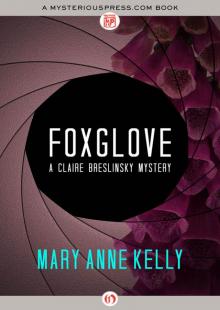 Foxglove
Foxglove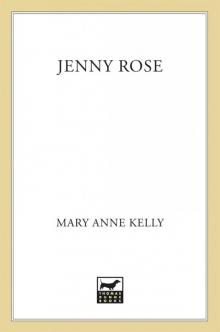 Jenny Rose
Jenny Rose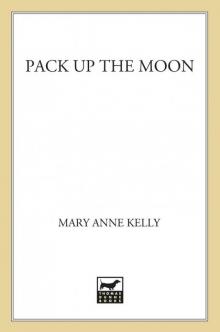 Pack Up the Moon
Pack Up the Moon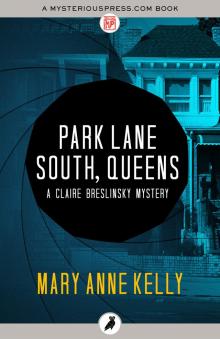 Park Lane South, Queens
Park Lane South, Queens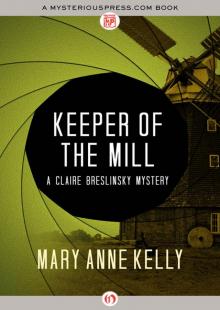 Keeper of the Mill
Keeper of the Mill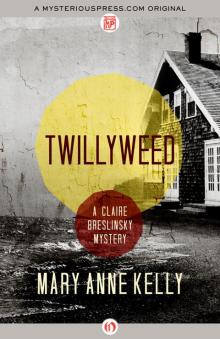 Twillyweed
Twillyweed